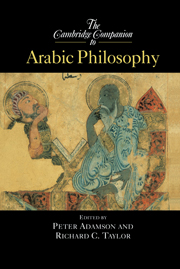Book contents
- Frontmatter
- 1 Introduction
- 2 Greek into Arabic
- 3 Al-Kindī and the reception of Greek philosophy
- 4 Al-Fāarābī and the philosophical curriculum
- 5 The Ismāīlīs
- 6 Avicenna and the Avicennian Tradition
- 7 Al-Ghazālī
- 8 Philosophy in Andalusia
- 9 Averroes
- 10 Suhrawardī and Illuminationism
- 11 Mysticism and philosophy
- 12 Logic
- 13 Ethical and political philosophy
- 14 Natural philosophy
- 15 Psychology
- 16 Metaphysics
- 17 Islamic philosophy and Jewish philosophy
- 18 Arabic into Latin
- 19 Recent trends in Arabic and Persian philosophy
- Select bibliography and further reading
- Index
18 - Arabic into Latin
the reception of Arabic philosophy into Western Europe
Published online by Cambridge University Press: 28 May 2006
- Frontmatter
- 1 Introduction
- 2 Greek into Arabic
- 3 Al-Kindī and the reception of Greek philosophy
- 4 Al-Fāarābī and the philosophical curriculum
- 5 The Ismāīlīs
- 6 Avicenna and the Avicennian Tradition
- 7 Al-Ghazālī
- 8 Philosophy in Andalusia
- 9 Averroes
- 10 Suhrawardī and Illuminationism
- 11 Mysticism and philosophy
- 12 Logic
- 13 Ethical and political philosophy
- 14 Natural philosophy
- 15 Psychology
- 16 Metaphysics
- 17 Islamic philosophy and Jewish philosophy
- 18 Arabic into Latin
- 19 Recent trends in Arabic and Persian philosophy
- Select bibliography and further reading
- Index
Summary
In the history of Western philosophy the role played by texts written in Arabic is crucial. This can be seen from the sheer volume of works that were translated (see the table that follows this chapter). We have hints of Arabic-speaking teachers of philosophy. Adelard of Bath (fl. 1116-50) speaks of his studia Arabica/Arabum studia (in reference to natural philosophy) and magistri, which he probably encountered in southern Italy and Sicily. Stephen of Pisa (fl. 1127), who wrote on cosmology in Antioch, expresses his debt to “a certain Arab.” Kamal al-Din ibn Yunus of Mosul (d. 1242), the greatest Muslim teacher of his time, in turn, boasted of Christians among his pupils; one of Ibn Yunus' pupils, Siraj al-Din Urmawi, became a member of Frederick II Hohenstaufen’s household and wrote a book on logic for him. Andrea Alpago (d. before 1546) acquired knowledge of Avicenna’s psychology from the Shī'ite scholar Muhammad ibn Makkī Shams al-Dīn al-Dimashqī (d. 1531) in Damascus. But it is through the surviving Arabic texts and their translations that we can best gauge the extent of the impact of Arabic philosophy. The works translated reflect the various genres current in Arabic.
- Type
- Chapter
- Information
- The Cambridge Companion to Arabic Philosophy , pp. 370 - 404Publisher: Cambridge University PressPrint publication year: 2004
- 5
- Cited by



